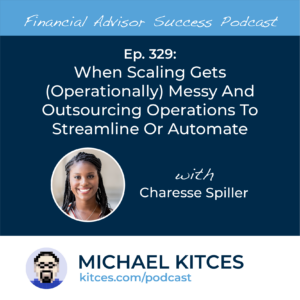
Enjoy the current installment of "Weekend Reading For Financial Planners" - this week's edition kicks off with the news that a recent study has found that many small- and mid-sized advisory firms that use "supported independence" platforms for their technology and back-office needs, have the potential to see greater growth in the years ahead given the efficiencies gained (and potential cost savings compared to creating a tech stack and hiring their own staff 'a la carte'), and give aspiring firm owners a platform to get their firms up and running quickly (whether breaking away or starting anew). Implying that part of the potential appeal to such support platforms is not simply about whether it's more cost-effective to use their tech and services to replace the advisor's own overhead costs, but that it's easier to scale up quickly as a fast-grower by leveraging incrementally more of the support platform's capabilities than needing to take the time to manage their own hiring and technology additions.
Also in industry news this week:
- A recent study indicates that advisors charging clients on a monthly subscription basis hiked their fees by an average of 6% in 2023, raising the salience of how advisors can most effectively communicate fee increases to clients
- A survey suggests that while financial advisors are increasingly aware of Artificial Intelligence (AI)-powered software tools and are frequently leveraging them in their personal lives, they appear to be more skeptical about using them to craft financial recommendations
From there, we have several articles on talent management:
- How financial advisory firms can expand the pool of candidates for open positions, from leveraging employees' professional networks to recruiting firm clients with relevant professional skills
- How effective leadership techniques, including inclusive vision-setting and giving employees autonomy, can help promote employee retention
- A recent report identifies actions financial planning firms can take to be more attractive (and fair) to women advisors, from boosting "sponsorship" programs that can help women advance within the firm to creating a culture that rewards performance rather than time spent in the office
We also have a number of articles on long-term care insurance:
- Why starting conversations about long-term care needs with a discussion of the client's care preferences rather than the products that might meet their needs could be a more effective approach for financial advisors
- Why costs for long-term care facilities tend to go well beyond the monthly rent charged and how advisors can adjust financial plan assumptions to reflect these expenses
- How advisors can help clients choose between traditional long-term care insurance policies and hybrid policies that combine long-term care coverage with life insurance
We wrap up with 3 final articles, all about health and wellness:
- How light movement, from a walk outside to climbing a few flights of stairs, can boost creative thinking
- Why sustained, moderate-intensity exercise can be particularly effective in boosting an individual's fitness and overall health
- Why, at a time when individuals can access increasing amounts of biometric data, constantly monitoring one's blood sugar levels might be counterproductive
Enjoy the 'light' reading!




 Welcome back to the 329th episode of the Financial Advisor Success Podcast!
Welcome back to the 329th episode of the Financial Advisor Success Podcast!
 Welcome back to the 309th episode of the Financial Advisor Success Podcast!
Welcome back to the 309th episode of the Financial Advisor Success Podcast!
 Welcome back to the 264th episode of the Financial Advisor Success Podcast!
Welcome back to the 264th episode of the Financial Advisor Success Podcast!
 Welcome back to the 256th episode of the Financial Advisor Success Podcast!
Welcome back to the 256th episode of the Financial Advisor Success Podcast!

